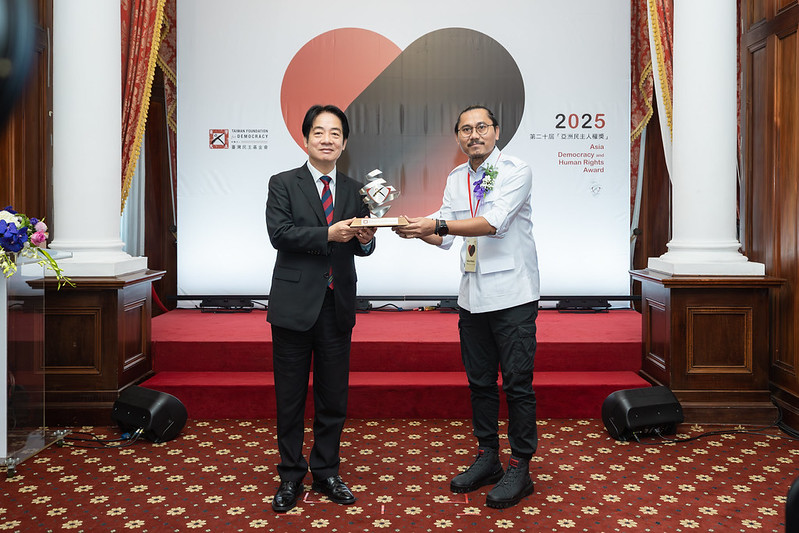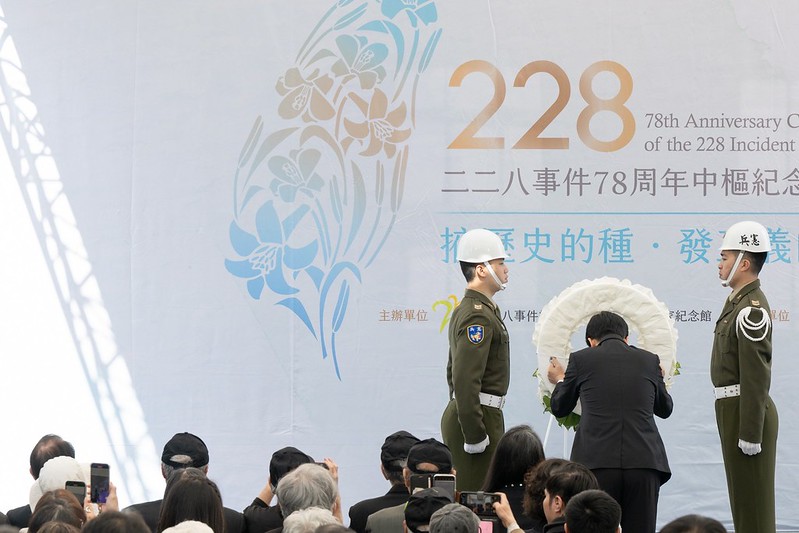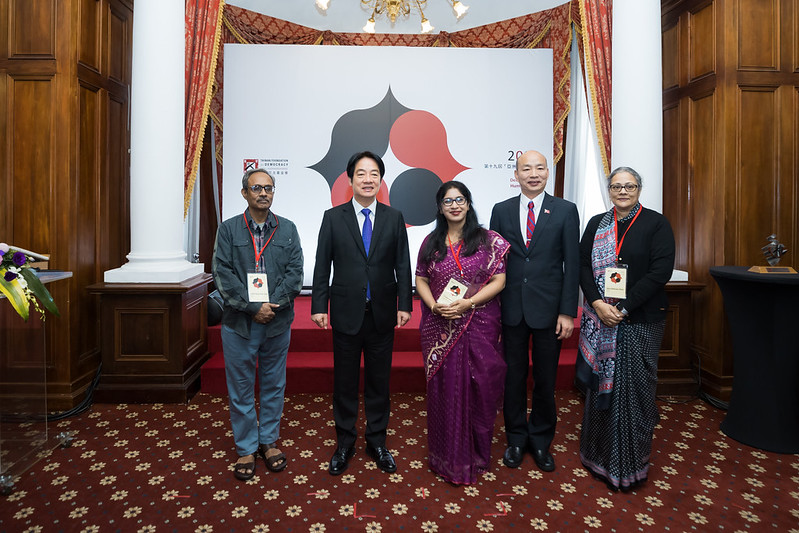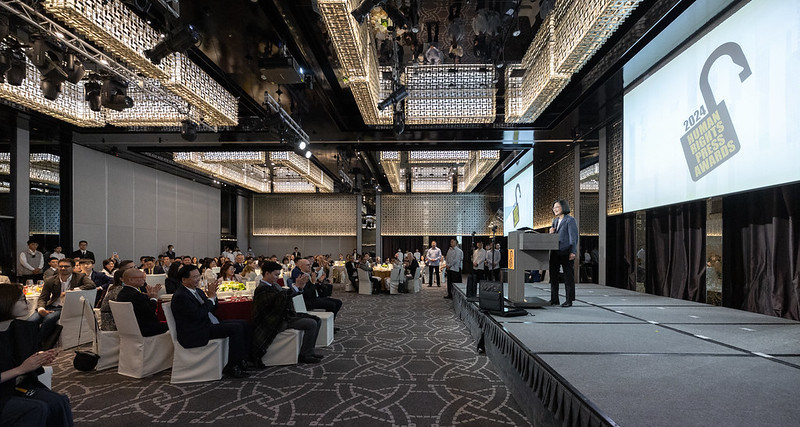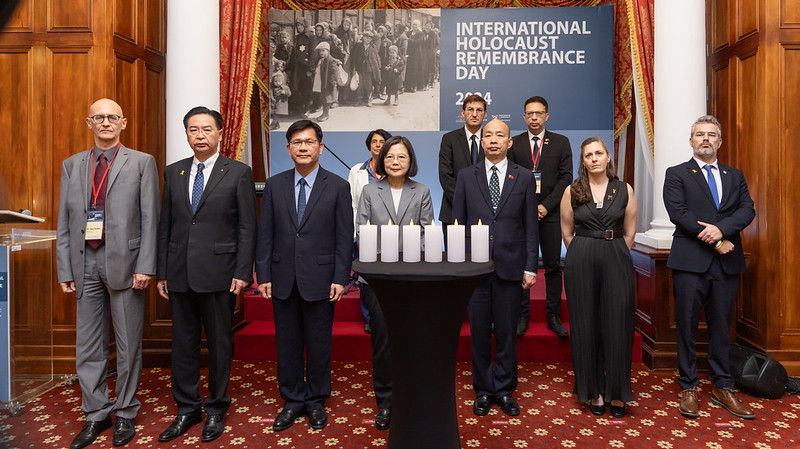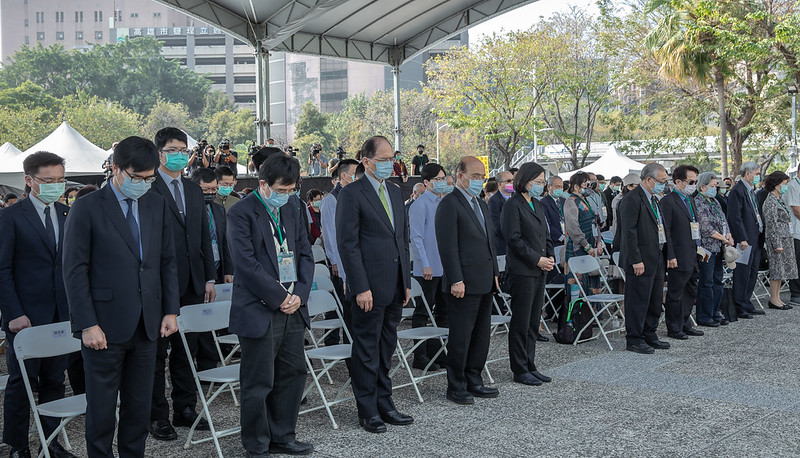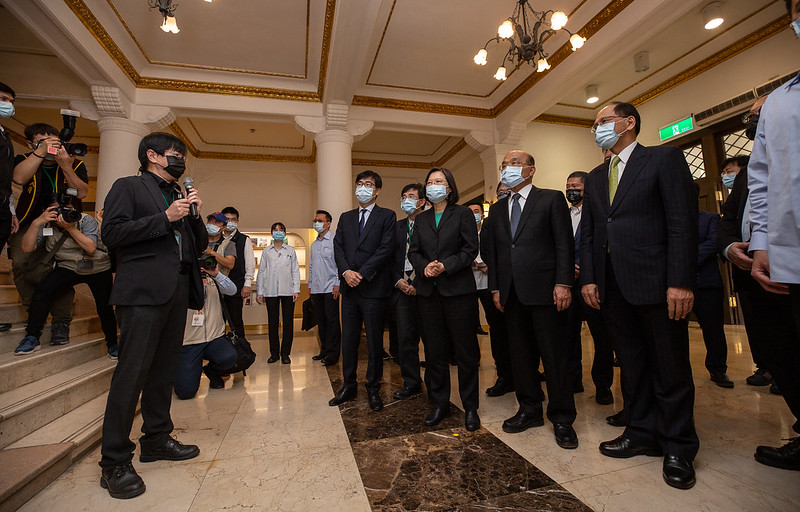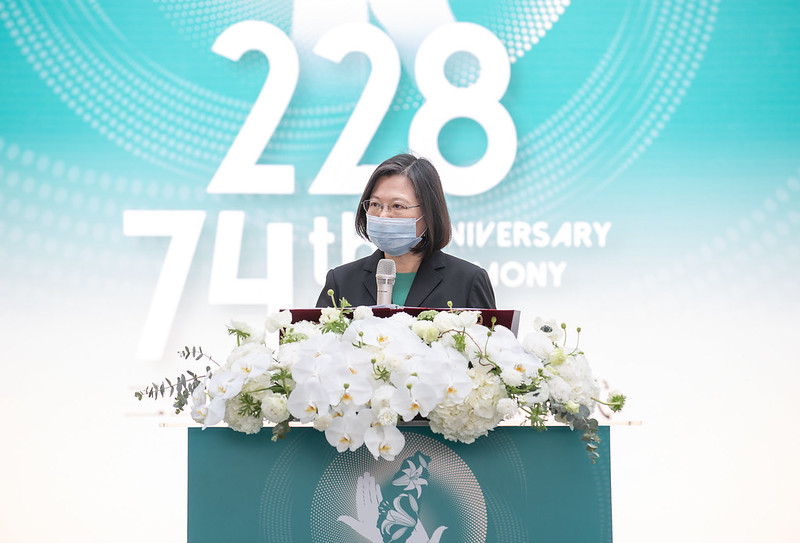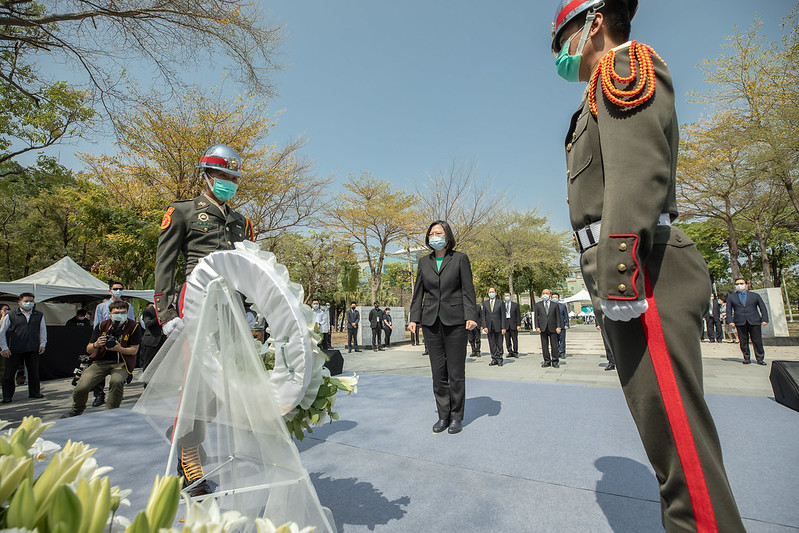News & activities
 News releases
News releases
On the morning of February 28, President Tsai Ing-wen traveled to Kaohsiung to attend the nation's main memorial ceremony marking the 74th anniversary of the 228 Incident. At the event, President Tsai presented a wreath of flowers in memory of the victims of the incident, and delivered remarks in which she emphasized the need for Taiwanese to face up to our own history while striving to uphold human rights and dignity. The president also encouraged the people of Taiwan never to compromise our belief in democracy and freedom, values she said were key to Taiwan's continued development. She further called on all Taiwanese to unite and work together to write our own history, so that the flowers of freedom and democracy will continue to bloom across this beautiful land.
A translation of the president's remarks follows:
We are here today in front of the Kaohsiung Museum of History. If we look closely, we can see a number of patches on the walls of this building's main entrance. Seventy-four years ago, this was one of the scenes of the 228 Incident in Kaohsiung, and these patches were applied to cover up bullet holes from that year.
On March 6, 1947, in the tense atmosphere following the events of February 28, the Kaohsiung Fortress Headquarters detained local leaders attempting to negotiate with the regime, after which military troops entered the city.
These troops targeted Kaohsiung's city hall, train station, and senior high school. Many city residents lost their lives. The father of Chairman Wang Wen-hong (王文宏) was killed in this incident. We have with us here today some of the descendants and relatives of other Kaohsiung elders involved in those negotiations.
Even those who were lucky enough to have survived also suffered immensely. You all know of Mr. Peng Ming-min (彭明敏). His father Peng Ching-kao (彭清靠) was speaker of the Kaohsiung City Council at the time and one of the local leaders detained. After his release, Peng Ching-kao was emotionally shattered, and never again took part in public affairs.
The 228 Incident, and the decades of authoritarian rule that followed, didn't just deprive Taiwan of the best and brightest of an entire generation. It also silenced the majority of Taiwanese just like it silenced Peng Ching-kao.
Those who died were never able to speak out again. And those who lived on no longer dared to speak out. Not only did the 228 Incident become a social taboo; in a way, secret police came to occupy the minds of all who lived through that era.
But despite living under authoritarian rule, the people of Taiwan did not give up. Generation after generation of Taiwanese continued to strive and fight for our democracy and freedom.
The Ciaotou Incident and the Kaohsiung Incident that happened here were both key milestones in this struggle for democracy.
These days, when we speak of the 228 Incident, we often speak of the need to learn the lessons of history and avoid repeating past mistakes. In fact, in today's democratic Taiwan, we have come a long way from the military suppression, arrests, and murders of that violent episode.
However, we must understand that the 228 Incident wasn't just an isolated event that occurred in the spring of 1947. The subsequent political purge, White Terror campaign, and shadow of authoritarian rule are the most painful memories from that era for people of all backgrounds across Taiwan.
We are gathered here in Kaohsiung today to pay tribute to the victims and console the bereaved. We should also take this time to remind one another of three things:
First, we must face up to our own history.
Over the past few days, we have seen the release of records from the 228 Incident and the ensuing period of authoritarian rule. These documents detail death sentences handed down by military judges, as well as violations of the separation of powers by high-ranking government officials who intervened in judgements on political cases.
These records are stored in the Taiwan Transitional Justice Database established by our Transitional Justice Commission. With this initiative, we hope to gain a deeper understanding of the ways in which human rights are violated through the systemic oppression of authoritarian rule. This is also how we remind ourselves that only democracy can give us governments with self-restraint and the courage to reflect on their actions.
Second, we must fully protect human rights and human dignity.
Last year, in accordance with the United Nations Paris Principles, we formally established a National Human Rights Commission. This independent body will not only draft reports, but will also continue to examine all regulations protecting human rights to determine whether they meet international standards. The commission will also help government agencies raise civil servants' awareness of human rights issues.
The experiences of other countries around the world show us that democracy can go into decline and authoritarianism can reemerge. To avoid another tragedy, we must internalize an awareness of human rights and make it part of our government's DNA. This is an important goal in our pursuit of transitional justice.
Third, we must never compromise our belief in democracy and freedom.
Developing a democratic system requires a difficult process of adaptation. It is possible to take two steps forward just to fall one step back. Perhaps there may be some who, fearing social unrest, come to yearn for the order of authoritarian rule.
But we must always remember to listen earnestly to and communicate with the public, so that we can allow diverse voices to emerge freely and creativity to be expressed naturally. This kind of democracy and freedom is the key to Taiwan's continued development. These fundamental values are non-negotiable.
Seventy-four years have passed since the 228 Incident. Our annual memorial ceremony marking this tragedy is not just a symbol of national introspection. It is a sign that the people of Taiwan will not forget our suffering under authoritarian rule, and will treasure our hard-won freedom and democracy.
Mayor Chen Chi-mai (陳其邁) mentioned Kaohsiung Municipal Kaohsiung Senior High School a few moments ago. The teachers and students at this school should remember where the bullet holes in the walls of your Red-Brick Building came from. And visitors to the Kaohsiung Museum of History should know the story behind the patches on its entrance.
The spirits of those who perished that year have never left us. They rest in the bosom of our homeland, and live on in the hearts of their fellow Taiwanese. All of us in Taiwan today, as well as future generations of Taiwanese, must unite and work together to continue to write our own history, so that the flowers of freedom and democracy will continue to bloom all across this beautiful land. Thank you everyone.
